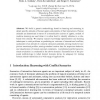Free Online Productivity Tools
i2Speak
i2Symbol
i2OCR
iTex2Img
iWeb2Print
iWeb2Shot
i2Type
iPdf2Split
iPdf2Merge
i2Bopomofo
i2Arabic
i2Style
i2Image
i2PDF
iLatex2Rtf
Sci2ools
113
click to vote
ICCS
2007
Springer
2007
Springer
Learning Common Outcomes of Communicative Actions Represented by Labeled Graphs
We build a generic methodology based on learning and reasoning to detect specific attitudes of human agents and patterns of their interactions. Human attitudes are determined in terms of communicative actions of agents; models of machine learning are used when it is rather hard to identify attitudes in a rulebased form directly. We employ scenario knowledge representation and learning techniques in such problems as predicting an outcome of international conflicts, assessment of an attitude of a security clearance candidate, mining emails for suspicious emotional profiles, mining wireless location data for suspicious behavior, and classification of textual customer complaints. A preliminary performance estimate evaluation is conducted in the above domains. Successful use of the proposed methodology in rather distinct domains shows its adequacy for mining human attitude-related data in a wide range of applications.
| Added | 08 Jun 2010 |
| Updated | 08 Jun 2010 |
| Type | Conference |
| Year | 2007 |
| Where | ICCS |
| Authors | Boris Galitsky, Boris Kovalerchuk, Sergei O. Kuznetsov |
Comments (0)

